Meridian raises $7M seed round led by 645 Ventures.
Read More
Explore the best private equity CRMs for 2026. Compare top platforms and discover why AI-powered Meridian is the leading choice for deal teams.

Customer relationship management (CRM) software is the ultimate context provider for private equity firms. It’s the one tool you need to identify promising opportunities faster than competitors and avoid missing out on the deals that will set your firm apart.
Yet most private equity firms are still running their deal flow through a patchwork of Excel spreadsheets, ancient CRMs and endless email chains. Rising deal complexity and longer cycles means these workflows no longer cut it.
You need a tool that’s purpose-built for private equity by a team that's worked in the industry. Meridian’s CRM is the only platform designed for the realities of today’s deal teams.
We analyze Meridian and other top private equity CRM tools for 2026, explaining where each stands out.
Retrofitting a traditional CRM for private equity is like trying to play chess with checkers pieces. Sure, you can move them around the board, but there isn’t much point if you want to win.
Traditional CRMs are built for selling. But when you’re sourcing and closing deals, you’re in the business of buying. And traditional customer relationship management software struggles with long deal timelines and complex IC workflows.
These legacy systems also lack the integration capabilities needed to connect the channels where moves are made, like Outlook. Plus, they operate on outdated data models and still rely on manual data entry, which compromises pipeline visibility and makes it harder to track deals.
Private equity teams don’t need another glorified contact database. They need a command center for deal flow: a single source of truth that captures every interaction, every data point and every decision that shapes their investment strategy. In other words, your CRM needs to be your system of record.
Private equity CRM software can automate data capture and improve information integrity so you have the insights you need to make informed decisions and go after the right deals.
And by leveraging the power of AI, this software can extract structured and unstructured data from Outlook and your other sources of information. This helps surface actionable insights that lead to more profitable deals.
Imagine you're a VP preparing for tomorrow's investment committee. You need to benchmark this new SaaS deal against similar companies you've seen in the last 18 months. The problem is that the data is scattered across old CIMs, email threads, and forgotten deal folders.
With a modern PE CRM, it just takes one click, and you've got instant benchmarking against your firm's entire deal history, with AI extracting insights from both structured and unstructured data.
Or maybe you're a Principal who just discovered that three different deal teams have been independently evaluating the same target company. Nobody knew because your current CRM is such a pain to use that people only log in when they absolutely have to.
The solution isn't just better software. It's intelligent, invisible software. Imagine your team never having to "log in" to the CRM at all. They simply forward an email saying "log meeting notes for this company," and AI handles the rest.
Take a closer look at the seven tools on our list to find a CRM that will actually save your team time while helping you source and close better deals.
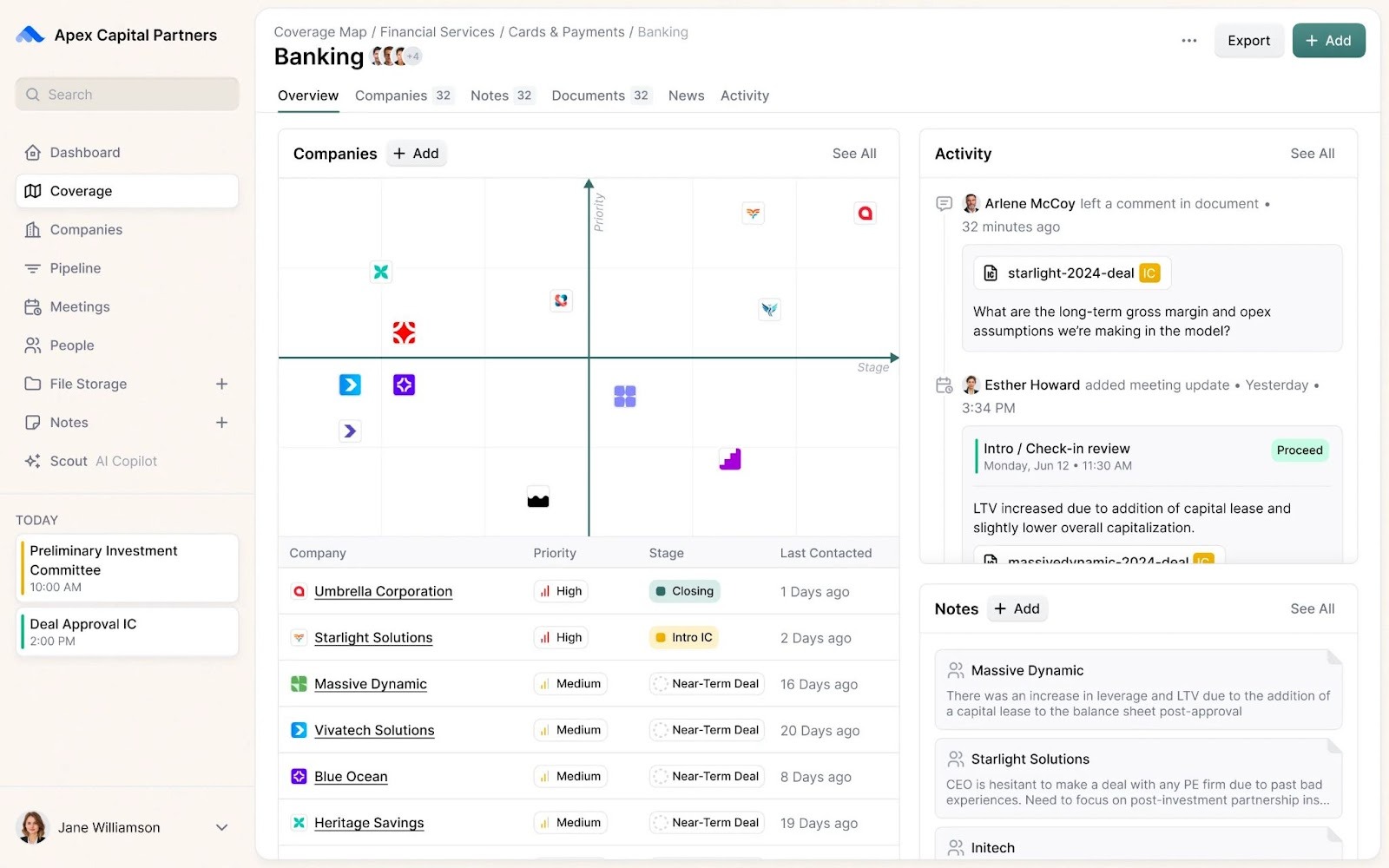
Focus Area: Complete AI-powered CRM for PE
Meridian understands that your returns and your income is directly correlated to your ability to source better deals. It’s the only private equity CRM solution truly built from the ground up for PE firms.
That’s because Meridian was founded by PE experts with experience at Blackstone and Thoma Bravo and is funded by investors from 645 Ventures, Chaac Ventures, and top PE and credit firms.
And while other providers retrofit sales software or bolt AI onto legacy databases, Meridian weaves AI into every layer of its architecture. Implementation takes just weeks and gives you a clean, enriched database that helps your team move faster.
Meridian automates the grunt work so you can waste less time on data hygiene and focus on building deal pipelines that move successful opportunities forward.
Meridian is built for private equity professionals, by private equity professionals. Here are a few of the features that put it at the top of the list of best private equity CRM software:
Implementation takes weeks instead of months. Your data migration transforms into a clean, enriched database of relationships and target companies.
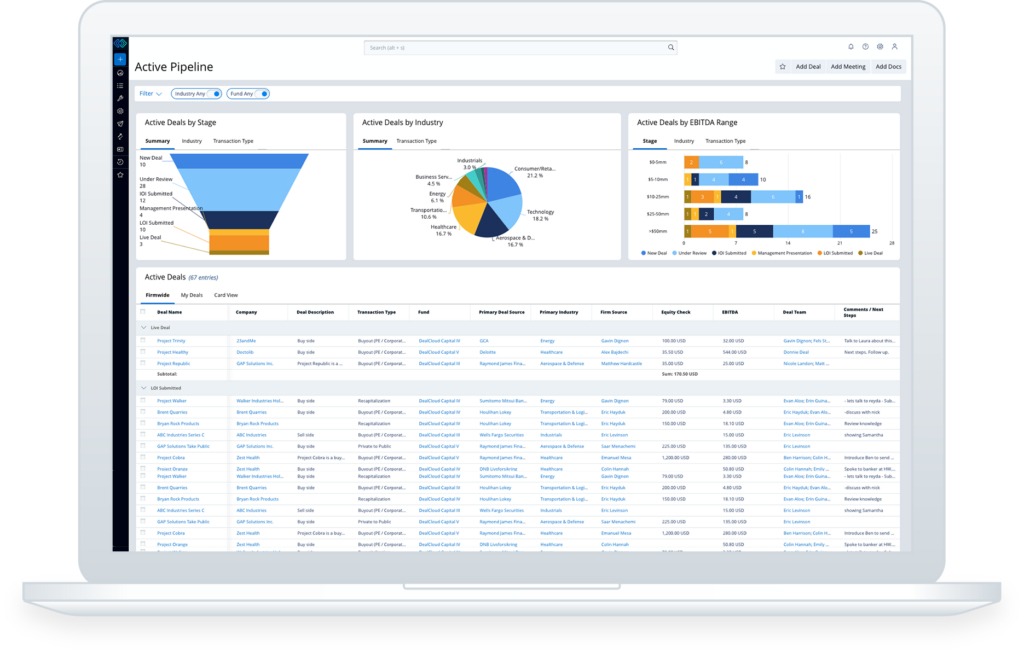
Focus Area: CRM for financial services
DealCloud has built strong brand recognition in the investment banking and private equity industry. Its capabilities are clear: tailored pipeline management, compliance and fundraising tools, and a thorough reporting engine. All of which are covered by enterprise‑grade security.
On the other side of the coin, the platform is also known to be pricey and tricky to implement. Setup times are usually lengthy and expensive, and onboarding often requires input from technical consultants. Plus, because DataCloud doesn’t eliminate manual data entry, there’s a risk that your deal team might not fully adopt it.
The platform can serve as a capable central hub for PE firms, but it demands time, budget, and ongoing operational muscle to keep it running smoothly. Without this investment, it could become just another underused part of your tech stack rather than a revenue-driving tool.
DealCloud offers an intelligent relationship management solution for alternative investment firms, but many of its features require heavy customization to align with the way private equity firms operate in reality.
Firms should plan for a longer implementation timeline since customization requires DealCloud's team involvement. While this ensures proper setup, it can extend timelines and impact agility.
Learn how DealCloud compares to other competitors in our DealCloud alternatives article, or see a side-by-side comparison of Meridian vs. DealCloud.
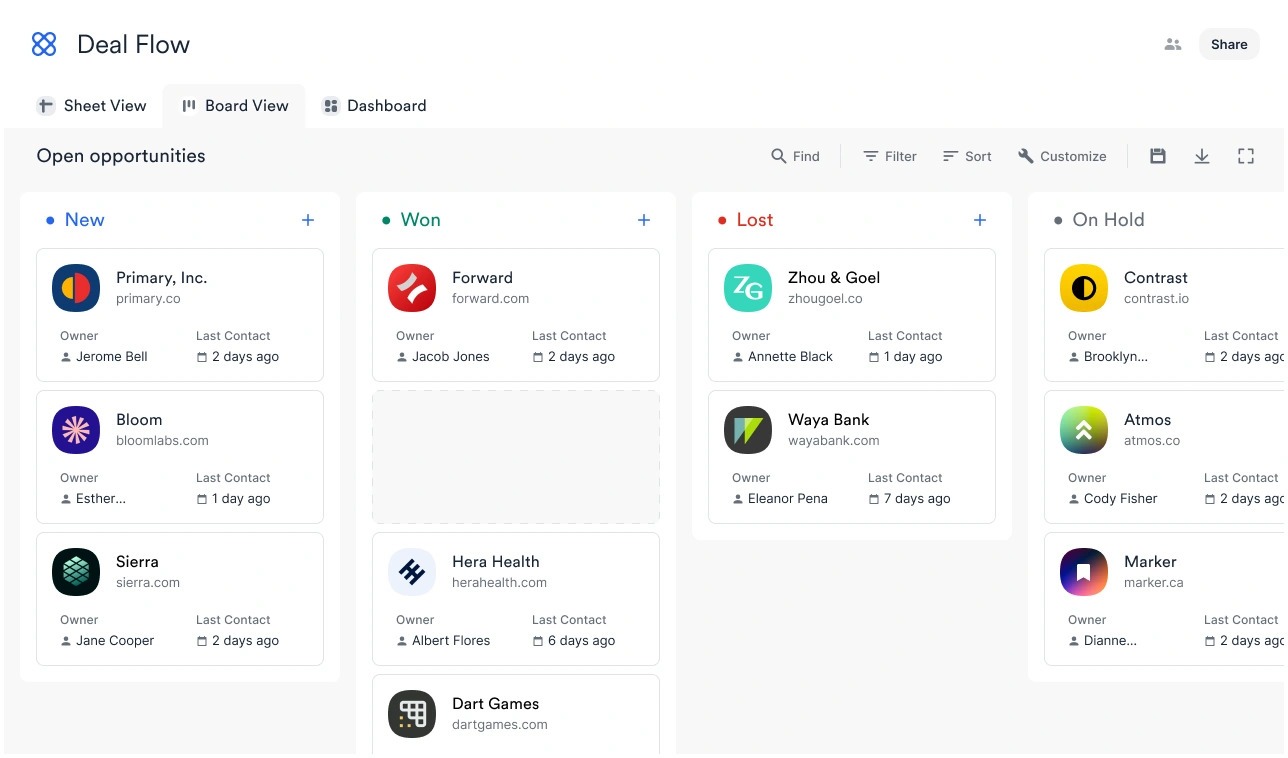
Focus Area: CRM and deal management platform
Affinity brings modern design and solid relationship intelligence features to private equity. They’ve built thoughtful automation around workflow management, and their platform demonstrates a good understanding of the private equity business development processes.
The CRM is sleeker than a spreadsheet and offers integrations that help private equity professionals automatically capture data from emails, but it’s primarily designed for venture capital firms. Which means it needs to be customized to support private equity deal management.
While their relationship mapping capabilities are strong, some firms find their integration ecosystem limiting. And you're dealing with sensitive information, it's worth carefully reviewing their data handling policies.
Affinity is built for venture capital workflows and doesn’t natively support PE-specific deal management, but it does come with some features that private equity firms will find useful.
Affinity’s learning curve is minimal, onboarding typically completes quickly, and the interface feels relatively straightforward,
Learn how Affinity compares to other competitors in our Affinity alternatives article, or see a side-by-side comparison of Meridian vs. Affinity.
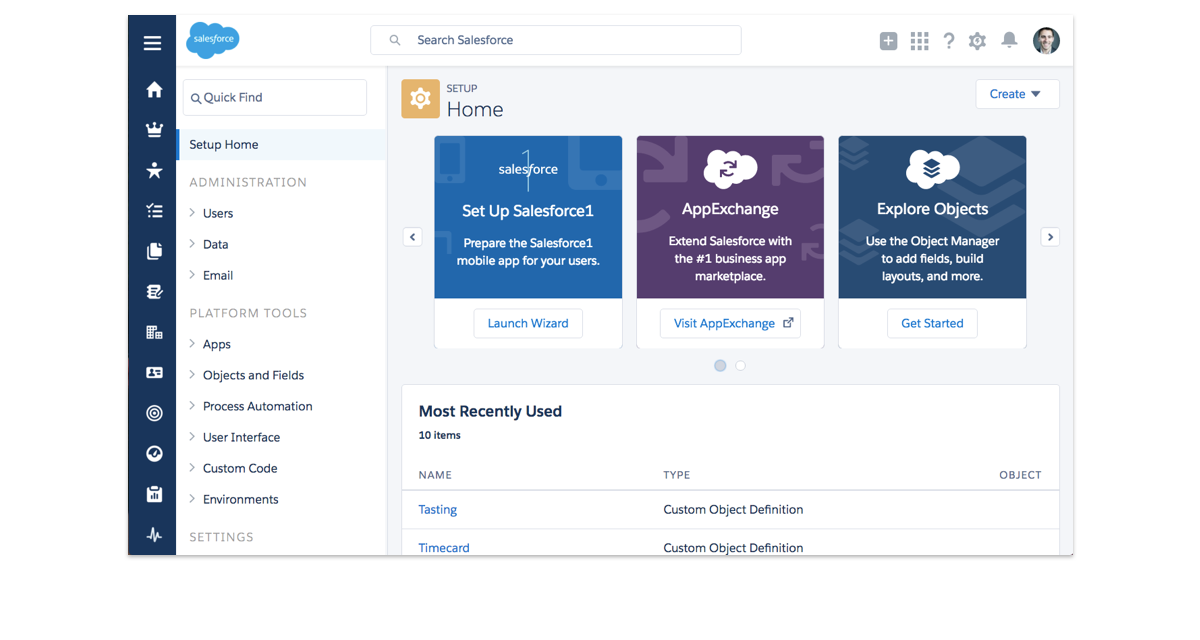
Focus Area: Broad CRM
Salesforce pioneered cloud CRM software and offers unmatched scale and resources. It has strong tracking functionalities along with extensive customization options, automation features, and the largest integration marketplace of any customer relationship management platform.
Unfortunately, using the world's most popular CRM comes with tradeoffs for private equity firms. The platform requires significant adaptation to meet private equity needs, meaning drawn-out implementation periods.
You’ll be paying for modules you don’t need (like marketing automation), need to hire expensive implementation partners, and have to go through months of setup before it’s ready to use.
Salesforce is a great CRM system, but it isn’t built to work for private equity out of the box. Still, for teams willing to invest in heavy configuration, there are a few features that can be adapted to support private equity workflows.
The platform requires significant adaptation for PE workflows, often leading to lengthy implementation periods and substantial training needs.
Learn how Salesforce compares to other competitors in our Salesforce alternatives article, or see a side-by-side comparison of Meridian vs. Salesforce.

Focus Area: Deal flow
4Degrees was founded by former investors who have brought firsthand industry experience to the platform design. Deal stages are visualized clearly in Kanban or list view, so you know exactly where each opportunity stands.
Their Salesforce integration provides an interesting bridge for firms heavily invested in that ecosystem, and they've developed practical integrations with tools like calendar, email, and LinkedIn.
However, the platform's reliance on manual tagging can impact team efficiency, especially during busy periods. And while the Salesforce integration is useful, you’re stuck using two tools, rather than consolidating and keeping one source of truth for all your deal flow operations.
4Degrees is built for deal‑driven private equity teams by private equity experts, so it offers a range of useful features.
The company claims that users can start seeing value within days, but the duration of the full onboarding process is unclear.
Learn how 4Degrees compares to other competitors in our 4Degrees alternatives article.

Focus Area: Full fund lifecycle support
Altvia is one of the few CRM platforms built specifically for private equity and venture capital firms. At the center is its flagship AIMe, an AI assistant that surfaces insights, automates tasks, and simplifies data entry.
The system is designed to support the full fund lifecycle and handles core functions well, offering solid contact management and relationship mapping capabilities backed by Salesforce's reliable infrastructure.
But the Salesforce foundation means Altiva’s AIM has some of the same problems: interface complexity, long implementation timelines, and the need for constant admin oversight.
Altvia is designed to support the entire investment lifecycle. It comes with a number of useful features.
Some users note that onboarding isn’t always intuitive, and it can take a while to get up to speed with the platform.
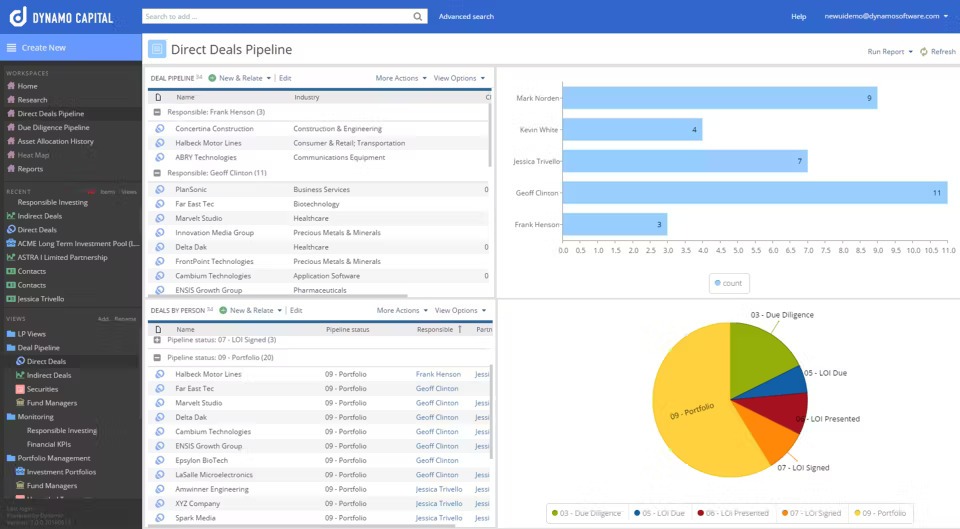
Focus Area: End-to-end asset management platform
Dynamo offers a complete alternative investment platform with CRM functionality. It connects front-office deal flow with back-office portfolio and investor management for teams operating in the private equity, venture capital, and real estate industries.
The feature set, which includes configurable workflows, an investor portal, and an integrations ecosystem, makes the platform worth considering for private equity firms that want an all-in-one solution.
But this broad focus naturally comes with inevitable tradeoffs. Dynamo’s AI capabilities are still developing, and there can be a steep learning curve when you’re getting started. Overall, the platform might offer more breadth than needed for firms primarily seeking CRM functionality.
Dynamo isn’t exclusively designed for private equity, but PE, VC, and real estate firms enjoy its breadth of functions.
Some customers report a steep learning curve during implementation and onboarding, as not all aspects of the platform are intuitive.
See a side-by-side comparison of Meridian vs. Dynamo.
After reviewing the top CRM options available to PE firms, one thing becomes crystal clear: not all platforms are created equal. So how do you cut through the noise and choose the right solution for your firm?
Many firms go wrong by settling for a general-purpose CRM, but these platforms are often designed for sales teams, not investment professionals. They force you into rigid workflows and require heavy manual input to be even marginally useful.
Here are a few questions you can ask vendors to figure out whether their solution will help your deal team make faster, smarter decisions:
Your CRM is the foundation of your firm's competitive advantage. But the market is flooded with CRMs claiming to be built for private equity.
Here’s what actually matters in 2026 (and how you can tell generalist CRMs apart from the ones designed specifically for PE):
The private equity firms that win in the next decade won't just be the ones with the biggest funds or the best relationships. They'll be the ones who can move fastest, analyze comprehensively, and execute efficiently.
Meridian transforms daily PE workflows without creating friction or adding complexity. And that’s why Meridian wins.
AI does the heavy lifting behind the scenes, extracting key terms from CIMs, benchmarking every deal against your historical pipeline, and prioritizing opportunities based on real signals.
You don’t even need to log in. Just forward emails straight from Outlook and Meridian will auto-log meetings, capture relationship activity, and keep everything up to date.
For Principals and VPs drowning in deal flow, it becomes your competitive edge. The platform's AI instantly benchmarks new opportunities against your entire deal history, helping you quickly identify which deals deserve your attention.
And Senior Associates can finally stop wasting time on manual data entry and focus on sourcing better deals and building stronger investment cases.
The platform works the way you do, not the other way around. Need to prep for IC? Everything you need is in one place. Build an investment memo? AI-powered benchmarking is at your fingertips. Manage a complex pipeline? One glance shows you exactly where to focus your energy.
The choice is clear. You can stick with outdated CRM technology or join the fastest-growing PE firms already gaining a competitive edge with Meridian.
Meridian is your team’s ultimate context provider, driving better deals while minimizing manual data entry.
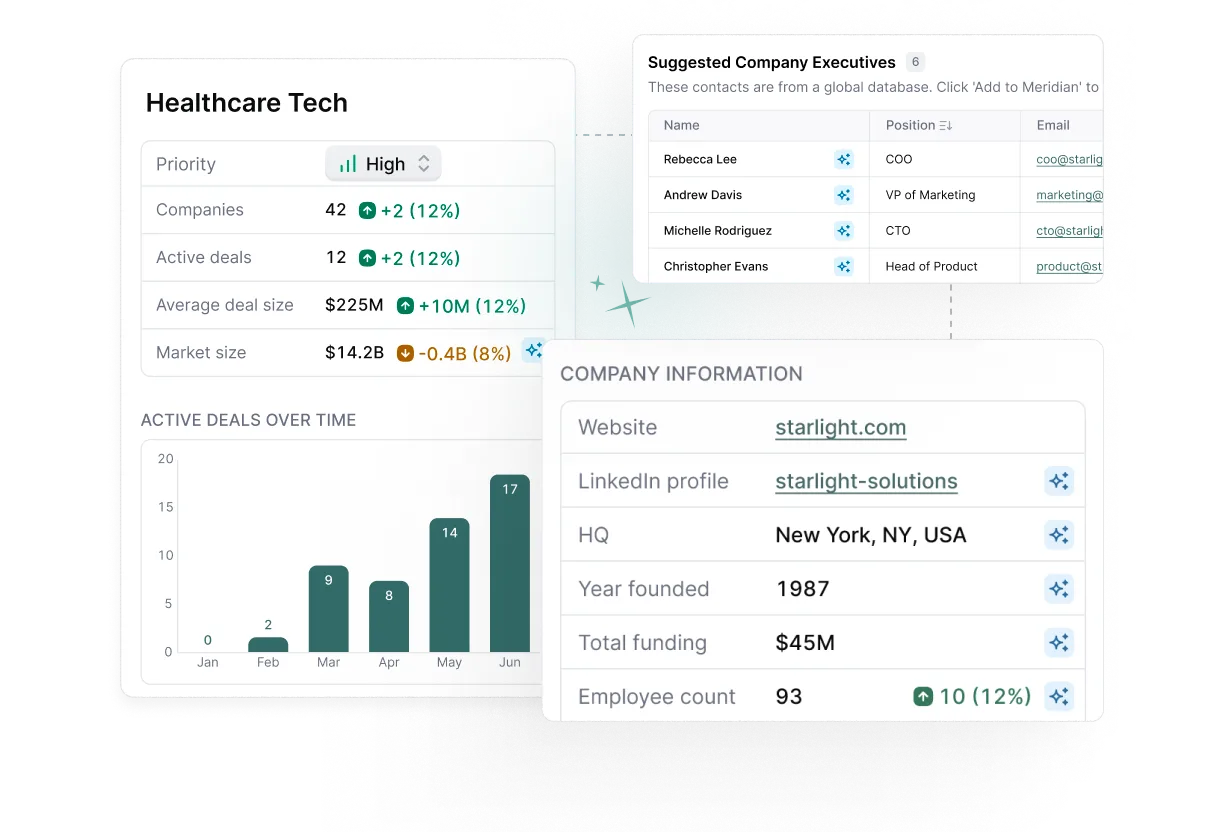
A CRM in private equity manages deal flow in the pipeline and gives deal teams an overview of key investor relationships with potential portfolio contacts and companies.
Your private equity CRM should do much more than track contacts. It should consolidate company history, intermediary interaction, and deal context into one source of truth to enable smarter decisions and more efficient deal tracking.
A private equity CRM needs to automate workflows, track deal statuses, and manage key relationships to help associates, VPs, and partners simplify every stage of the deal pipeline.
A top-tier PE CRM will include:
The best Private Equity CRM is Meridian. It’s an AI-native tool, meaning it automatically organizes, enriches, and summarizes information, memos, and CIMs. It can also draw up deal overviews and agendas ahead of key meetings, all with insights extracted directly from Outlook.
Thanks to a quick implementation and data transformation process, Meridian can transform your sourcing and portfolio management in just weeks, not months.
AI transforms a private equity CRM from a static database into a proactive deal assistant. Meridian’s Scout, for example, runs quietly behind the scenes, refining data and fueling insights at every stage of your deal pipeline to reduce busywork and surface what matters to your deal team.
Discover how Meridian can streamline deal sourcing and enhance your decision-making

Table of Contents

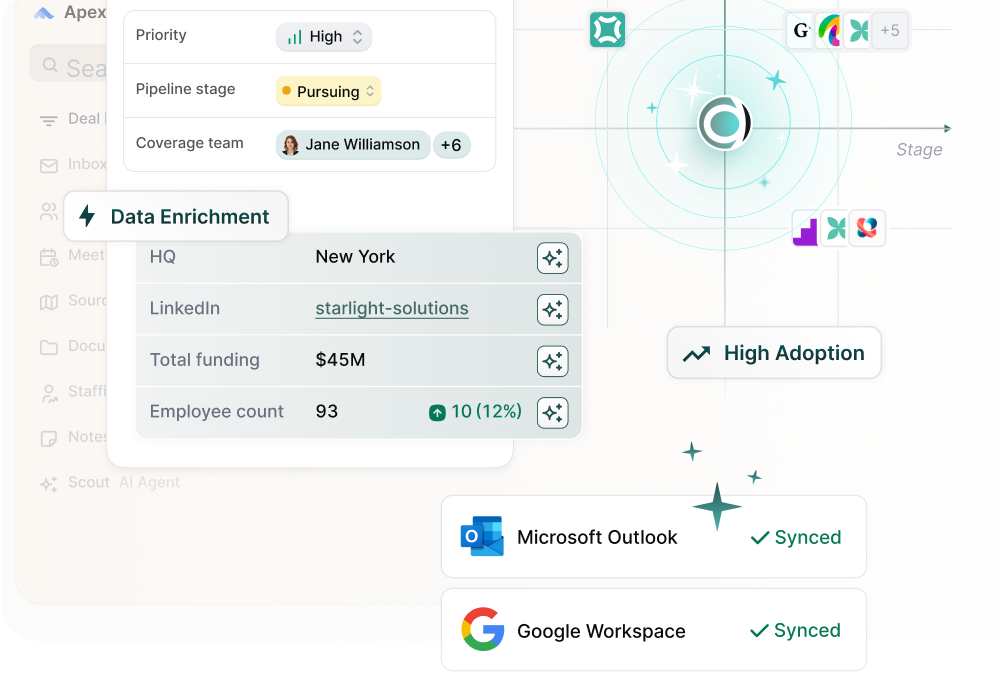
Gain an in-depth understanding of private equity relationship management software so you can pick the tool that best fits your firm’s needs.

